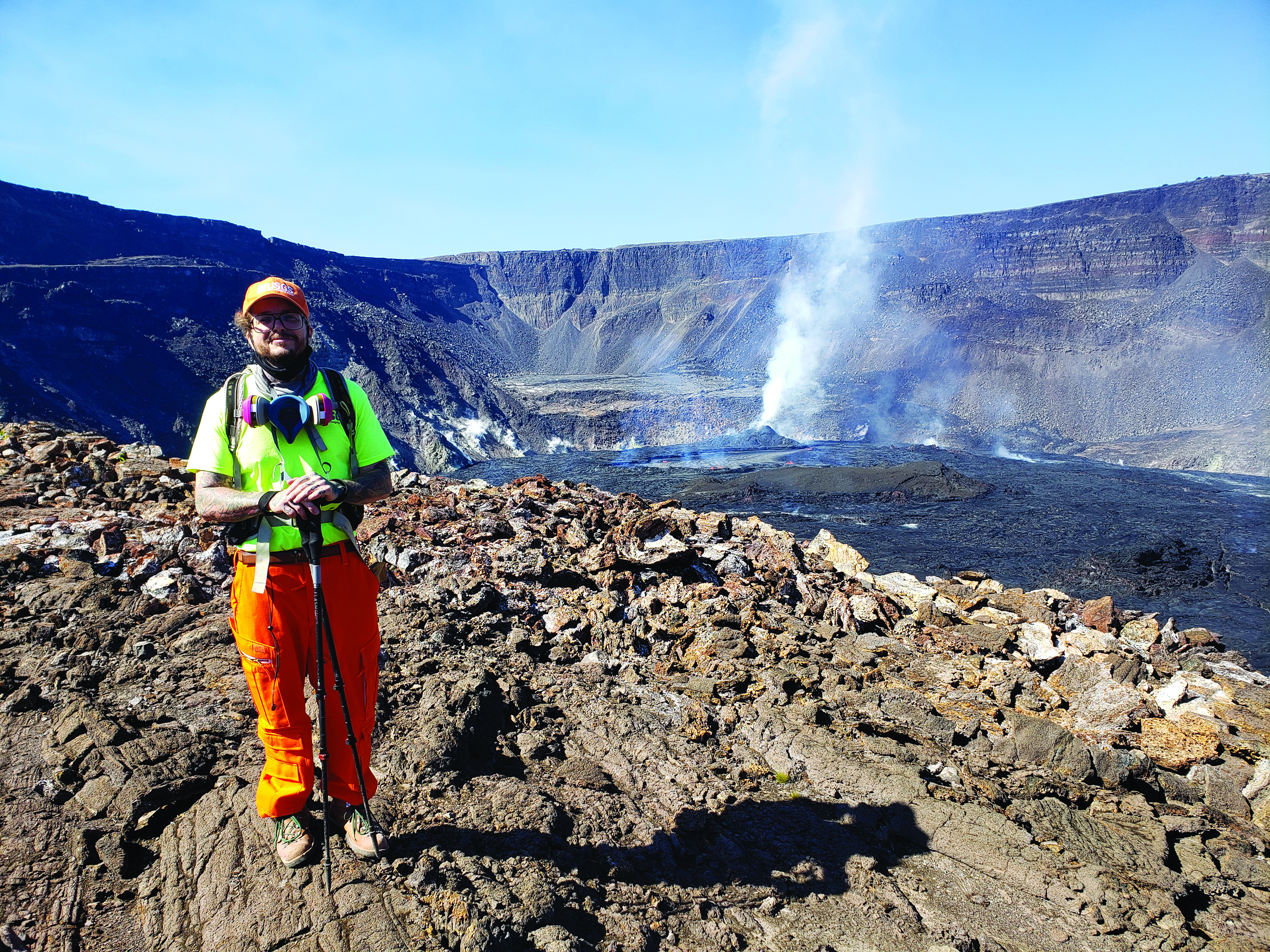Research Geophysicist Ashton Flinders
Fall
2024
Feature
Research Geophysicist Ashton Flinders
Ashton Flinders
Every day, over my morning coffee, I decide whether I’m going to spend the day at the computer or head out into the field and hike across a volcano.
I study and monitor volcanoes on the Island of Hawaii, with an emphasis on measuring and modeling variations in the gravitational field associated with changes in active volcanic storage systems. I also get to fly over the volcanoes in helicopters, which is always a blast!
My path to this career was very, very twisty! I started at the University of Wisconsin - River Falls as a biology/preveterinary major. After taking a zoology lab, I quickly realized that it wasn’t for me. I latched onto the only topic I was enjoying at the time: chemistry. In my junior year, I was still insatiably curious as to “why”—Why did this reaction take place this way? Why do these electrons go there? and so on. My physical chemistry teacher recommended that I take some physics courses, and I eventually decided to double major.
By ten years later, I had followed a circuitous path that included receiving a master's degree in geology and geophysics from the University of Hawaii in 2010, a second master’s in ocean engineering from the University of New Hampshire in 2014, a PhD in oceanography from the University of Rhode Island in 2016, a US Geological Survey (USGS) Mendenhall Post-Doctoral Fellowship with the California Volcano Observatory, and a Presidential Management Fellowship. During all those years of school, I also managed to spend about two years total at sea, including aboard two research cruises to north of the Arctic Circle.
C4 - Flinders1.jpg

Ashton Flinders inside Kīlauea caldera, on the edge of a subsided crater formed during the 2018 eruption of the volcano Kīlauea in the Hawaiian Islands. The crater was subsequently filled with lava from a series of ongoing eruptions. The orange pants are part of a fire-retardant helicopter flight suit; you have to take a helicopter flight to get down there!
In 2019, I landed a permanent research position at the Hawaiian Volcano Observatory, where I am today. I still consider myself an applied physicist, as well as an experimentalist. My experiment is the volcano—I have some power to deploy configurations of sensors in order to make observations and propose and test hypotheses. However, I am still on a volcano! This makes some of my efforts and goals logistically difficult to achieve—and sometimes impossible.
My area of expertise, gravity and gravity instrumentation, is very much focused on the cutting edge. One challenge is that it's not as easily made operational as other classic geophysical monitoring techniques, such as seismology and global navigation satellite systems monitoring. Just last year, we purchased a $650,000 absolute quantum gravimeter, the first in the US government!
My advice to current undergraduates is to be curious! Be adventurous! Don’t settle on a linear path from A to B. Take classes in everything, even if they seem completely unrelated to what you want to study or do. The best asset we have is our imagination, and our ability to imagine and play is fueled by our exposure to new ideas. Some of the most impactful research advances I have seen in my field were instigated by someone stepping out and adopting methods, techniques, and theories from seemingly unrelated fields of science.
Also, don’t be discouraged if you don’t get where you want to go—just keep swimming! Eighty percent of everything is being in the right place at the right time.
Physicists Can Do What?
Ever wondered what you can do with a physics or astronomy degree? Check out the Hidden Physicist stories published in Radiations, the magazine of Sigma Pi Sigma. Real people with backgrounds in physics and astronomy who didn’t become professors write about their careers in baking, science journalism, data privacy, and many more areas, and share advice with undergraduates. Go to sigmapisigma.org/sigmapisigma/radiations/hidden-physicists.
